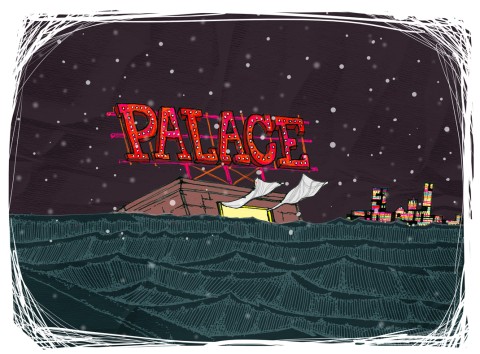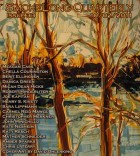The view delivers: Snow. Falling in perverse flakes against a dull sky, dust to white on pawnshop awnings where it catches, compiling, as each speck drops in the whole, uniqueness another fallacy, another bogus line. Neon signs flicker like insect traps. Doors remain shut. Two blocks down the ocean crashes against the shoreline. Not that I can see. It’s practically a blizzard, a paperweight stirred—but inside there’s hardly a sound.
Once we lived like locals. Rented a single-story cape in Brigantine with a peeling front porch and a hammock and a doormat of fake grass. My father found a job in hospice care, so the night Harrah’s opened he took us, mom and April, the whole family. We almost lasted the year. My mother wore a green halter dress without a bra, silk clinging to her hips, unforgiving of childbirth, but when the bouncer carded her he made up for every last debt. April and I flattened noses to the glass that spanned the casino’s second floor playroom, entranced by slots, tables lush as lawns, and our parents gliding among them, electric on red carpets, lifting golden drinks from trays. Absence killed April. She belted “blackbird singing in the dead of night,” their wedding song, but they heard nothing; they did not come. We ate hot fudge sundaes in saucers shaped like roulette wheels. Refills were unlimited. We ate until we lost count, our bellies sick from syrup and nuts and cherries stamped on whipped cream. I could die, April said for the first time, the sugar—so I wrapped my freckled arms around her and we sank into a beanbag and slept like babes in a wood. By morning, my mother’s mascara had fled her eyes and my father had lost his tie. He offered gifts: a button each, slip pins without safety notches, dealers’ decks, a couple of loose chips that felt in my palm like sand dollars.
Delilah on the radio would think I’ve lost it, which implies that it is something I once had. Who else would come down here in winter? I do not gamble. I do not have affairs. Mine is a life without shadows, towel wrapped and fastening, a life only one gets to leave.
I am in luck. The boardwalk is pristine. No footprints in the snow. No bodies on benches. No sailor hats for sale. When we lived here the beach was a minefield of bottles and needles. Something fell in the Atlantic that summer, altering the pH, generating such an excess of algae our bodies glimmered like the magic of glow sticks. April worried the current until the girl next door enlisted her to gather shells and seaweed clumps, slog pails of jellyfish beneath the boardwalk, where they spent days scooping and carving and mastering naked girl sculptures in the sand.
Before she died April told me to take care of myself. She meant, be careful. I am suggestible. Weather makes me weak. This hotel is designed to evoke the Roman Empire, columns and fountains. Pillows are down. The bed is king-sized and circular. Gilded drapes sweep baseboards heavy with smoke from a time before statewide cigarette bans. A plaster-poured bust on the dresser has chipped its nose. I cough once but it’s not happening. My lungs remain strong and clear.
Strawberries! April would have insisted. Snow falls and nothing is fresh but berries arrive boiled and mashed, preserved in miniature jars. I could dial room service, spread jam on toast; fertilize my empty lap with crumbs. It’s ridiculous, really. Who isn’t tired? Instead of exhausting options I lie here and lie here and lie.
In Brigantine the girl next door hung her dotted panties on the clothesline, kept a family of guinea pigs in a plastic sandbox behind her concrete porch. She was an only child, so she loved my sister and never let me pet them. The pigs nursed from a bottle of water clipped to the side, and after the beach she and April would feed them carrots and celery sticks, clutch their trembling bodies to their cheeks, and tuck them in with newsprint, until one after the next bled to death from the rectum.
With April it was always something: her pain pervasive yet idiopathic, lodged in the ears and nose, tingling in her wrists and bowels and buried deep in the throat. Headaches knocked her out, light made her hurl, she saw spots at twilight and stripes at dawn but there was never a name for it; it was ordinary business. Chest spasms gripped her, she sweat through heart palpitations, suffered spasmodic eyelid movements, compressed nerves and swollen legs, but as with other passions everyone assumed her sickness simply made up for what was not there.
Last night I wore heels. Seniors motored by in wheelchairs with cups jangling like Salvation Army bells. Waitresses flashed varicose veins beneath white vinyl skirts. Girls danced on the bar in torn stockings for suits with nametags and three-ring binders, and in the club the emcee was a midget with hair pasted to his scalp like a discus thrower. The mechanical bull sat broken and strangled in yellow tape, the site of a recent crime investigation. A neon corridor connects Caesar’s Palace to Bally’s Wild West; for hours I paced it, as if it offered T-shirt shops and taffy stands and not streams of homeless, Chinese tourists, as if I was browsing, just passing through.
Open, I call out from bed. It could be anyone. Maids. Porters. Lost guests. A tray abandoned by my door. This is Atlantic City in winter. All it takes is a knock. I’d let anyone in.



 The core workshop of SmokeLong Fitness is all in writing, so you can take part from anywhere at anytime. We are excited about creating a supportive, consistent and structured environment for flash writers to work on their craft in a community. We are thrilled and proud to say that our workshop participants have won, placed, or been listed in every major flash competition. Community works.
The core workshop of SmokeLong Fitness is all in writing, so you can take part from anywhere at anytime. We are excited about creating a supportive, consistent and structured environment for flash writers to work on their craft in a community. We are thrilled and proud to say that our workshop participants have won, placed, or been listed in every major flash competition. Community works.